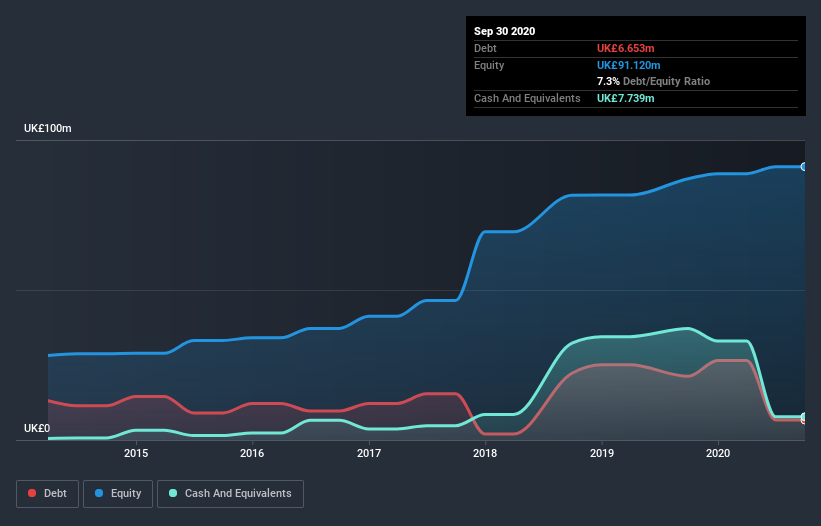
David Iben put it well when he said, 'Volatility is not a risk we care about. What we care about is avoiding the permanent loss of capital.' So it might be obvious that you need to consider debt, when you think about how risky any given stock is, because too much debt can sink a company. As with many other companies Treatt plc (LON:TET) makes use of debt. But the real question is whether this debt is making the company risky.
What Risk Does Debt Bring?
Debt assists a business until the business has trouble paying it off, either with new capital or with free cash flow. Part and parcel of capitalism is the process of 'creative destruction' where failed businesses are mercilessly liquidated by their bankers. However, a more frequent (but still costly) occurrence is where a company must issue shares at bargain-basement prices, permanently diluting shareholders, just to shore up its balance sheet. Of course, plenty of companies use debt to fund growth, without any negative consequences. When we examine debt levels, we first consider both cash and debt levels, together.
See our latest analysis for Treatt
What Is Treatt's Net Debt?
As you can see below, Treatt had UK£6.65m of debt at September 2020, down from UK£21.2m a year prior. However, its balance sheet shows it holds UK£7.74m in cash, so it actually has UK£1.09m net cash.

How Strong Is Treatt's Balance Sheet?
According to the last reported balance sheet, Treatt had liabilities of UK£16.0m due within 12 months, and liabilities of UK£16.4m due beyond 12 months. Offsetting these obligations, it had cash of UK£7.74m as well as receivables valued at UK£23.9m due within 12 months. So its liabilities outweigh the sum of its cash and (near-term) receivables by UK£754.0k.
Having regard to Treatt's size, it seems that its liquid assets are well balanced with its total liabilities. So it's very unlikely that the UK£546.2m company is short on cash, but still worth keeping an eye on the balance sheet. While it does have liabilities worth noting, Treatt also has more cash than debt, so we're pretty confident it can manage its debt safely.
Also good is that Treatt grew its EBIT at 12% over the last year, further increasing its ability to manage debt. There's no doubt that we learn most about debt from the balance sheet. But ultimately the future profitability of the business will decide if Treatt can strengthen its balance sheet over time. So if you're focused on the future you can check out this free report showing analyst profit forecasts.
Finally, a company can only pay off debt with cold hard cash, not accounting profits. Treatt may have net cash on the balance sheet, but it is still interesting to look at how well the business converts its earnings before interest and tax (EBIT) to free cash flow, because that will influence both its need for, and its capacity to manage debt. Over the last three years, Treatt saw substantial negative free cash flow, in total. While that may be a result of expenditure for growth, it does make the debt far more risky.
Summing up
We could understand if investors are concerned about Treatt's liabilities, but we can be reassured by the fact it has has net cash of UK£1.09m. On top of that, it increased its EBIT by 12% in the last twelve months. So we are not troubled with Treatt's debt use. When analysing debt levels, the balance sheet is the obvious place to start. But ultimately, every company can contain risks that exist outside of the balance sheet. To that end, you should learn about the 2 warning signs we've spotted with Treatt (including 1 which is concerning) .
When all is said and done, sometimes its easier to focus on companies that don't even need debt. Readers can access a list of growth stocks with zero net debt 100% free, right now.
If you’re looking to trade Treatt, open an account with the lowest-cost* platform trusted by professionals, Interactive Brokers. Their clients from over 200 countries and territories trade stocks, options, futures, forex, bonds and funds worldwide from a single integrated account. Promoted
Valuation is complex, but we're here to simplify it.
Discover if Treatt might be undervalued or overvalued with our detailed analysis, featuring fair value estimates, potential risks, dividends, insider trades, and its financial condition.
Access Free AnalysisThis article by Simply Wall St is general in nature. It does not constitute a recommendation to buy or sell any stock, and does not take account of your objectives, or your financial situation. We aim to bring you long-term focused analysis driven by fundamental data. Note that our analysis may not factor in the latest price-sensitive company announcements or qualitative material. Simply Wall St has no position in any stocks mentioned.
*Interactive Brokers Rated Lowest Cost Broker by StockBrokers.com Annual Online Review 2020
Have feedback on this article? Concerned about the content? Get in touch with us directly. Alternatively, email editorial-team (at) simplywallst.com.
About LSE:TET
Treatt
Manufactures and supplies various natural extracts and ingredients to beverage, flavor, fragrance, and consumer goods markets in the United Kingdom, Germany, Ireland, rest of Europe, the United States, rest of the Americas, China, and internationally.
Flawless balance sheet with solid track record and pays a dividend.
Similar Companies
Market Insights
Community Narratives



